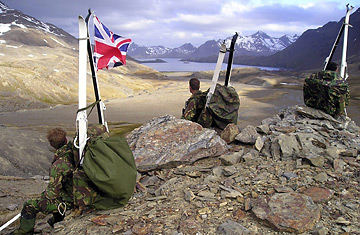
British troops taking part in an exercise on the southern Atlantic island of South Georgia in 2004. Britain is preparing a claim for sovereign rights covering gas and oil resources over a wedge of the Antarctic seabed.
In politics as in medicine, there are some contagions that spread despite the most prudent vaccines. Witness the news this week that the United Kingdom has decided to lay claim to 385,000 sq mi (1 million sq km) of seabed off the coast of Antarctica, despite being a signatory to the 1959 treaty that was supposed to protect the earth's most desolate continent from the vagaries of international competition.
This infection could be traced back halfway around the globe to the Arctic, where a new competition for sovereignty heated up this summer even as the ice cap shrank, at an ever-accelerating pace, to an alarming new minimum. There it was Russia and its jingoistic jaunt in August to the Arctic Ocean floor at the North Pole that inspired Canada, the United States, Denmark and Norway to freshen up their own claims to the Arctic. Considerable — but still largely uncharted — oil and gas deposits are the attraction, and they become ever more enticing as prices for petroleum soar and exploitation technology improves.
So is Britain playing the role of the Russian bear at the other end of the globe? Not exactly. Six other countries (Argentina, Australia, Chile, France, New Zealand and Norway) have also laid claims to sectors of Antarctica; those of Chile and Argentina overlap with the British claim. (The United States recognizes none of them, but reserves the right to make its own claim down the line.) Each of those seven claims include coastline, and every coast presents an opportunity under Article 76 of the U.N. Convention on the Law of the Sea: If you can prove that the continental shelf extends out into the sea, you can claim mineral rights out to a maximum of 350 nautical miles. This is precisely what Britain is preparing to do in Antarctica, and it won't be the first: Australia and New Zealand have already submitted similar claims to Antarctic waters to the relevant U.N. Commission.
Nor will the British claim be the last, since all claims under the law of the Sea have to be submitted by the spring of 2009. And that's the point. A spokeswoman for the Foreign Ministry told reporters that London was merely "safeguarding for the future," and that no challenged claim — as the British one is sure to be — can be acted on. But the claim points out the limits of the 1959 Antarctic Treaty, and a codicil adopted in 1991. It does an admirable job of protecting the land — banning nuclear material, declaring the Antarctic to be a "natural reserve, devoted to peace and science," and prohibiting any mining — but not the surrounding seas, which support a singular ecosystem ranging from krill to penguin, from seal to whale.
If any country develops the right and the means to drill for offshore oil in Antartica, and particularly if they hit pay dirt, it's not just that ecosystem that could be endangered. So could the ban on mining on the Antarctic continent itself, which can be lifted by unanimous agreement at any time. That is highly unlikely, but just a couple of decades ago, so was the prospect that the ice caps would melt. The British claim, and those that are sure to follow, amounts to a long-shot move that enables resorting to a future temptation. For the sake of Antarctica, let's hope we've got beyond oil and gas before that temptation ever arises.
